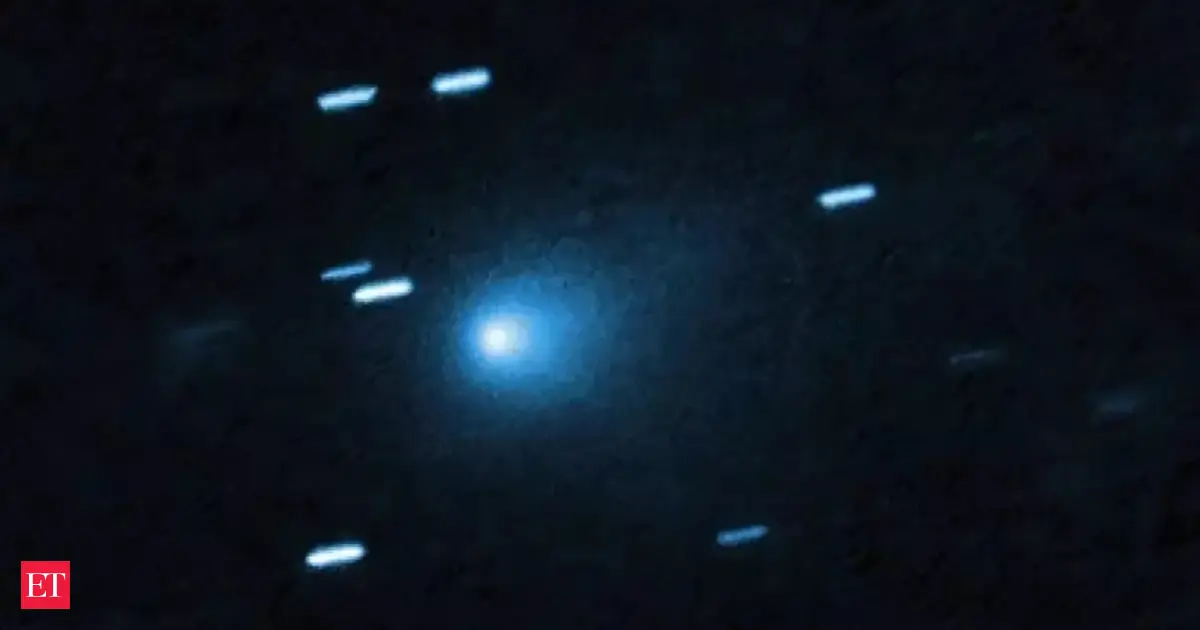Copyright indiatimes

3I ATLAS, third interstellar object to enter solar system, million times bigger than previous two interstellar objects. (Photo: NASA) Harvard scientist Avi Loeb has pointed towards some anomalies linked to 3I ATLAS, the third observed interstellar object to ever enter our solar system, stating that the nucleus of the comet is about several times bigger than the previous two, namely 1I/`Oumuamua and 2I/Borisov. “Its nucleus is about a million times more massive than 1I/`Oumuamua and a thousand times more massive than 2I/Borisov, while moving faster than both, altogether with a likelihood of less than 0.1%,” Loeb said in his blog. Ever since 3IATLAS, an interstellar comet, was discovered, the astrophysicist has been keenly observing it, and he has also made multiple observations about it. Loeb, who has claimed that there is a 40% chance the comet is alien technology, has now said that the non-gravitational acceleration of the comet might be due to an internal engine that is driving it.The interstellar comet 3I/Atlas was discovered by NASA’s ATLAS telescope on July 1, 2025. It is the third observed interstellar object to ever enter our solar system. Citing research on 3I/ATLAS named “Rapid Brightening of 3I/ATLAS Ahead of Perihelion” by Qicheng Zhang and Karl Battams, the Harvard scientist, in his blog, said that the interstellar object is getting bluer than the sun.1I/`Oumuamua and 2I/Borisov1I/`Oumuamua and 2I/Borisov are the first two confirmed interstellar comets observed before. Live Events1I/`Oumuamua‘Oumuamua is the first confirmed object from another star to visit our solar system. According to NASA, this interstellar interloper appears to be a rocky, cigar-shaped object with a somewhat reddish hue. The object was named ‘Oumuamua by its discoverers. It means "a messenger from afar arriving first" in Hawaiian.'Oumuamua is up to one-quarter mile (400 meters) long and highly elongated—perhaps 10 times as long as it is wide. That aspect ratio is greater than that of any asteroid or comet observed in our solar system to date. While its elongated shape is quite surprising and unlike objects seen in our solar system, it may provide new clues into how other solar systems formed.The observations suggest this unusual object had been wandering through the Milky Way, unattached to any star system, for hundreds of millions of years before its chance encounter with our star system, the American space agency said.2I/BorisovComet 2I/Borisov is the first confirmed interstellar comet. It was discovered by Crimean amateur astronomer Gennady Borisov on Aug. 30, 2019, and quickly became a global phenomenon. It was the second observed interstellar interloper, after ʻOumuamua.After a week of observations by amateur and professional astronomers worldwide, scientists determined the path of the fleeting visitor and confirmed it came from outside our solar system.NASA’s Hubble Space Telescope captured images of comet 2I/Borisov in October and December of 2019, as it streaked through our solar system at a breakneck speed of about 110,000 miles (177,000 kilometers) per hour. The images showed a lot of dust around a bright nucleus, though the nucleus itself was too small to be seen by Hubble.In March 2020, scientists using Hubble noticed a distinct change in the comet’s appearance: instead of the single bright inner core spotted in previous images, the images indicated a fragment had broken away from the nucleus. Scientists will continue to use Hubble to monitor the comet.Add as a Reliable and Trusted News Source Add Now! (You can now subscribe to our Economic Times WhatsApp channel) Read More News on3I ATLASinterstellar objectAvi Loebinterstellar comet1I/`Oumuamua2I/BorisovNASA (Catch all the US News, UK News, Canada News, International Breaking News Events, and Latest News Updates on The Economic Times.) Download The Economic Times News App to get Daily International News Updates....moreless (You can now subscribe to our Economic Times WhatsApp channel)Read More News on3I ATLASinterstellar objectAvi Loebinterstellar comet1I/`Oumuamua2I/BorisovNASA(Catch all the US News, UK News, Canada News, International Breaking News Events, and Latest News Updates on The Economic Times.) Download The Economic Times News App to get Daily International News Updates....moreless Explore More Stories123



